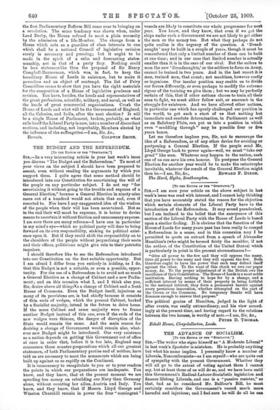THE BUDGET AND THE REFEREND1J3L
[To Tax EDITOR OF ras "SPECTATOR.") SIR,—In a very interesting article in your last week's issue you discuss "The Budget and the Referendum." To most of your views on the subject I should have been prepared to assent, even without reading the arguments by which you support them. I quite agree that some method should be introduced into our Constitution for ascertaining the will of the people on any particular subject. I do not say "for ascertaining it without going to the trouble and expense of a General Election," because a General Election in ninety-nine cases out of a hundred would not attain that end, even if resorted to. Nor have I any exaggerated idea of the wisdom of the people when their will has been ascertained. But as in the end their will must be supreme, it is better to devise means to ascertain it without friction and unnecessary expense. I am sure there are many reforms—I have one in particular in my mind's eye—which no political party will dare to bring forward on its own responsibility, staking its political exist- ence upon it. But if they could shift the responsibility on to the shoulders of the people without jeopardising their seats and their offices, politicians might give rein to their patriotic impulses.
I should therefore like to see the Referendum introduced into our Constitution on the first suitable opportunity. But I am afraid I differ from you entirely in holding, as I do, that this Budget is not a suitable, or even a possible, oppor- tunity. For the use of a Referendum is to avoid not so much a General Election as a change of Cabinet and a new Parlia- ment; and on this occasion what I, and I think also you, Sir, desire above all thingsks a change of Cabinet and a fresh House of Commons. Even the Budget itself, injurious as many of its provisions are, is bad chiefly because it consists of thin ends of wedges, which the present Cabinet, backed by a Socialist majority, intend in the future to drive home. If the same Cabinet and same majority were to frame another Budget instead of this one, even if the ends of the new wedges were thinner, the danger of disruption of the State would remain the same. And the main reason for desiring a change of Government would remain also, what- ever new Budget might be introduced. Our very existence as a nation depends on getting this Government out of office at once in order that, before it is too late, England may commence those counter-preparations which all our greatest statesmen, of both Parliamentary parties and of neither, have told us are necessary to meet the armaments which are being built up against us so rapidly on the Continent.
It is unnecessary to recapitulate to you or to your readers the points in which our preparations are inadequate. You know, and they know, that at the present moment we are spending less money on rebuilding our Navy than Germany alone, without counting her allies, Austria and Italy. You know, and they know, that if Messrs. Lloyd George and Winston Churchill remain in power the four " contingent "
vessels are likely to constitute our whole programme for next year. You know, and they know, that even if we got the ships under such a Government we are not likely to get either the men or the money too. But what they perhaps do not quite realise is the urgency of the question. A ' Dread- nought ' may be built in a couple of years, though it must be remembered that only a limited number of them can be built at one time ; and in our case that limited number is actually smaller than it is in the case of our rival. But the sailors to man the new 'Dreadnoughts,' or the soldiers to form an Army, cannot be trained in two years. And in the last resort it is men, trained men, that count ; not machines, however costly or ingenious. Our insular position may enable us to divide our forces differently, or even perhaps to modify the extreme rigour of the training we give them ; but we may be perfectly certain of this, that if other nations choose to train all their sons to fight, we must either follow suit, or succumb in the struggle for existence. And we have allowed other nations, in particular one which has openly challenged our position in the -world, to get such a start of us that nothing but immediate and resolute determination, in Parliament as well as on Salisbury Plain, can put us into a position in which even "muddling through" may, be possible four or five years hence.
Let me therefore implore you, Sir, not to encourage the idea of a Referendum, or of any other device for avoiding or postponing a General Election. If the people send Mr. Lloyd George back to power again—well, we must "take our gruel" like men. Whatever may happen to the nation, each one of us can save his own honour. To postpone the General Election for another year would be to make the catastrophe inevitable, whatever the result of the General Election might
then be.—I am, Sir, &c., EDWARD F. DIXON. The Hard, Hythe, Southampton.










































 Previous page
Previous page